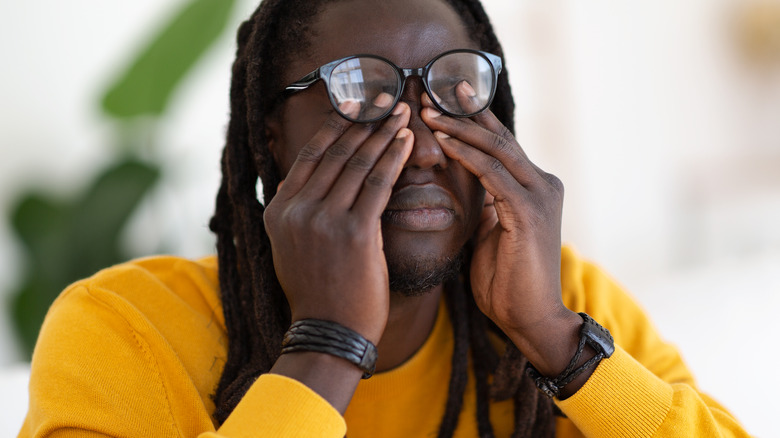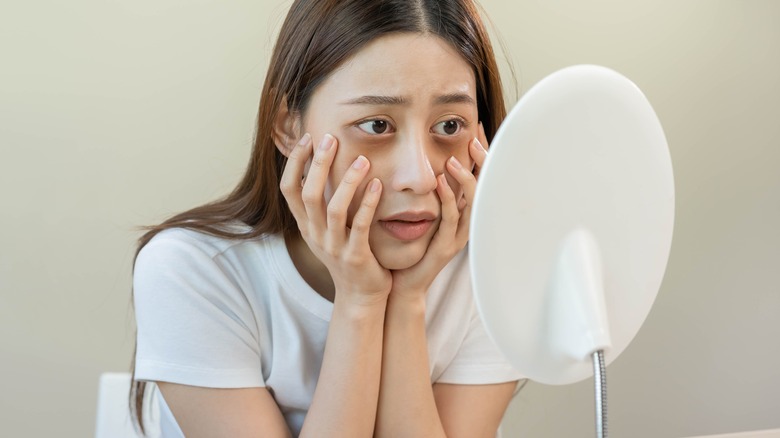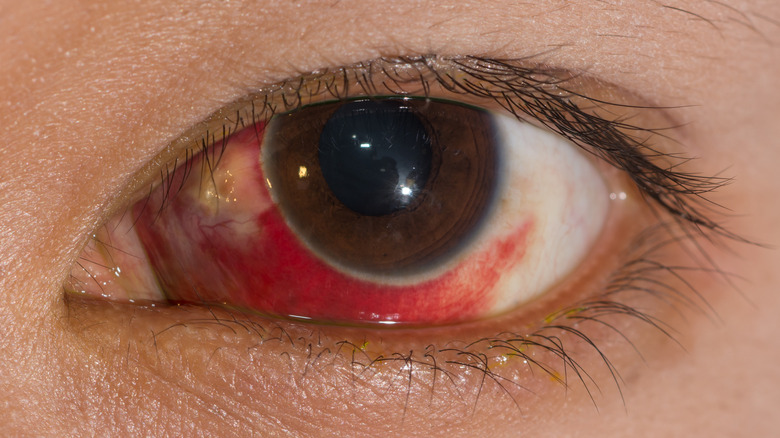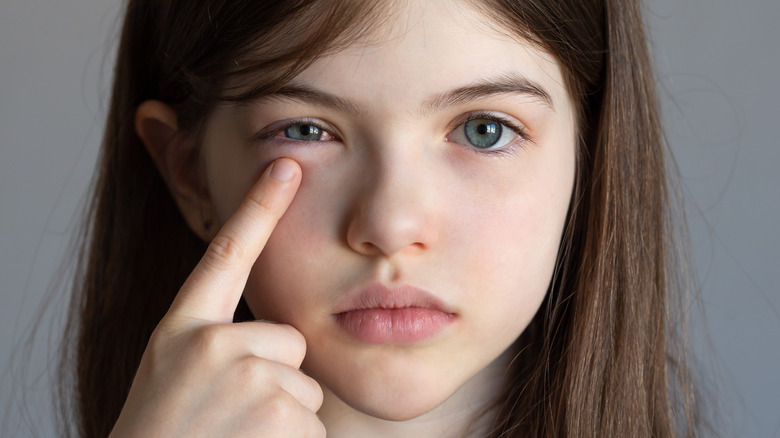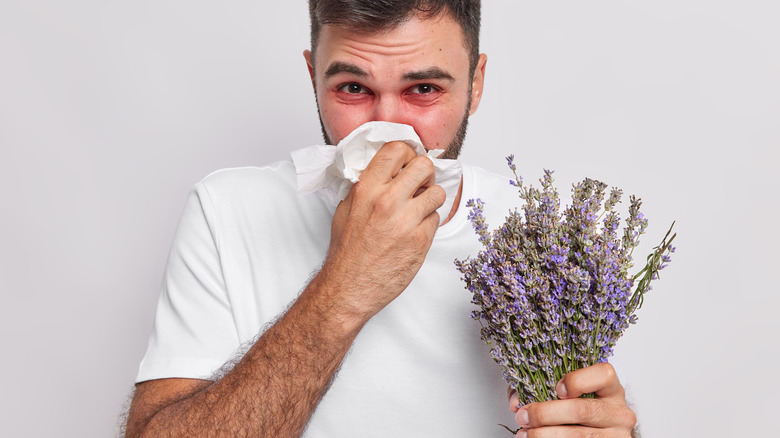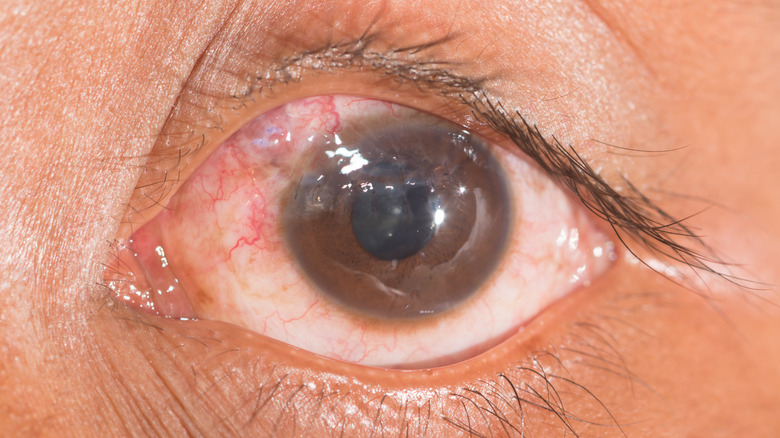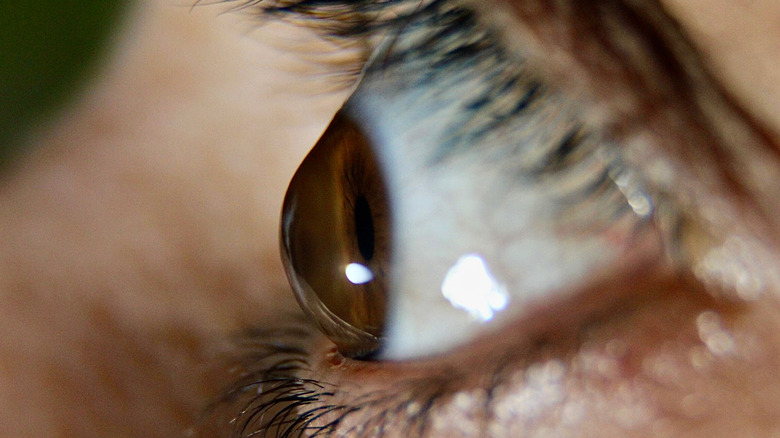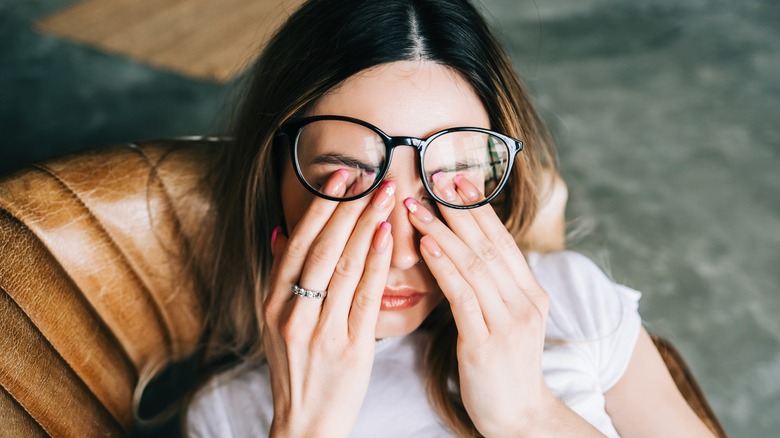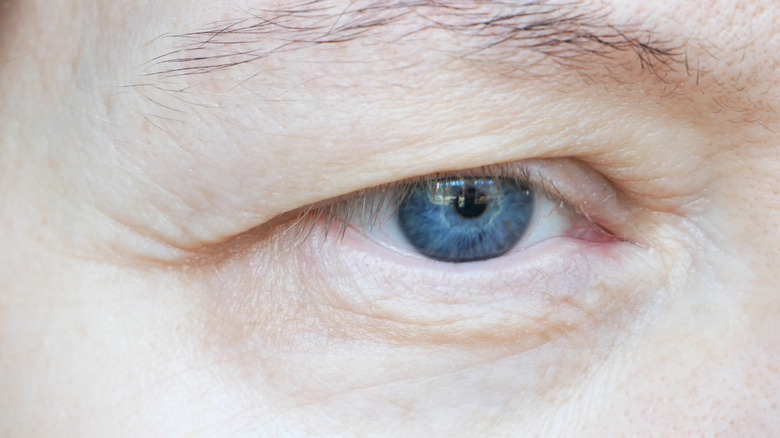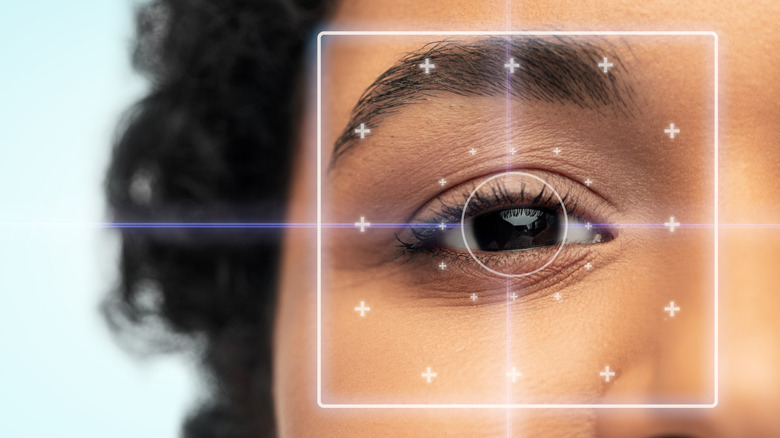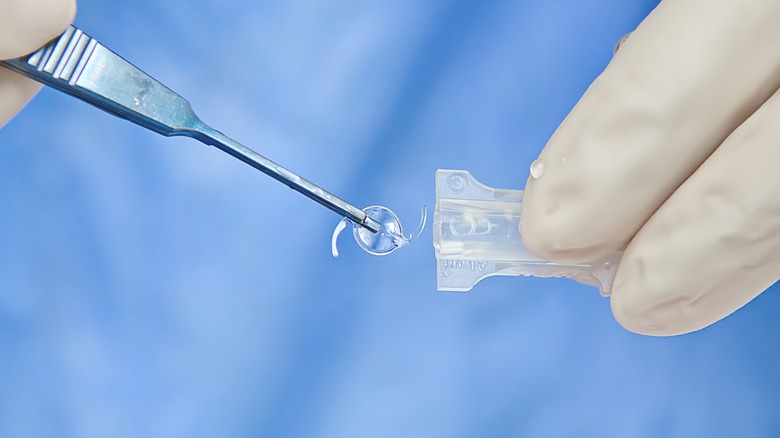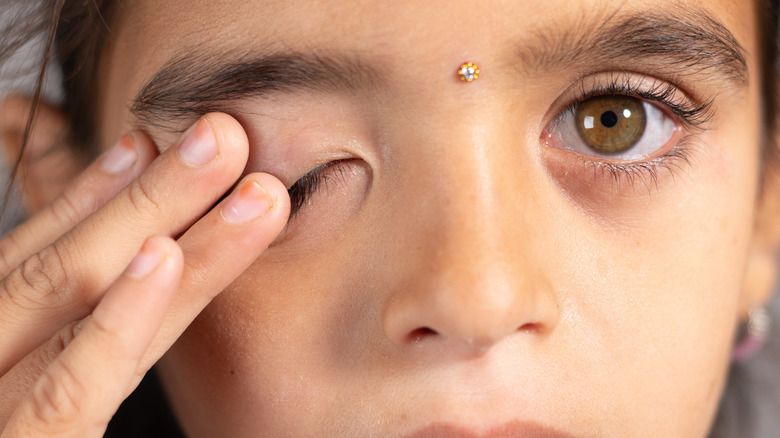Reasons You Should Avoid Rubbing Your Eyes
Like any normal human being, you've probably felt the urge to rub your eyes before. Maybe something got into your eyes, or perhaps you were groggy after waking up.
The urge to rub your eyes becomes particularly strong when you have allergies, eye infections, or dry eyes, or when you remove your contact lenses. This is because the eyes can feel irritated, itchy, or uncomfortable during those instances. Repeated eye rubbing can also become an impulse for people with mental disabilities or behavioral disorders (via Defeat Keratoconus). Basically, there are many reasons why some people develop the habit of rubbing their eyes. Rubbing your eyes feels good because it triggers tear production, which lubricates and soothes the eyeball. Also, you initiate a reflex that reduces heart rate and relieves stress, which makes you feel more relaxed.
Granted, rubbing your eyes is a pretty easy thing to do, and it seems harmless, too. But is it really something you should do? Here are some of the risks associated with eye rubbing.
You may get dark circles
Dark circles give the skin around your eyes, especially your under-eyes, a deeper or hyperpigmented tone. The area may take on a blackish, purplish, or brownish hue, depending on your skin color (via the Cleveland Clinic).
It's possible to get dark under-eye circles if you rub your eyes excessively. As board-certified dermatologist Devika Icecreamwala explained to Huffpost, rubbing the sensitive skin around the eyes irritates and traumatizes it. The skin responds by getting thicker and darker. You may also break blood vessels under the skin if you rub it. Due to the thinness of the skin around the eye, damage to the blood vessels underneath it can become noticeable.
Apart from eye rubbing, there are a couple of other reasons why dark circles appear, such as stress, sun exposure, alcohol use, dehydration, or not getting enough sleep. They may also be caused by skin conditions like contact dermatitis or eczema. Dark circles appear more often if you have certain genes or due to aging. Generally, dark circles are not a cause for concern as they pass with time, though they do tend to make people look tired and older.
Vigorous eye rubbing can result in bloodshot eyes
Eye rubbing causes trauma to the thin, clear tissue (conjunctiva) on the surface of the eye. This trauma might pop a blood vessel under the conjunctiva and cause bleeding and redness. The medical term for this is subconjunctival hemorrhage (via All About Vision). This condition might cause a mild itchy feeling in the eye; otherwise, you might not notice anything else except a bright red spot or widespread eye redness.
Subconjunctival hemorrhage usually goes away on its own within one to two weeks, and it's not really a cause for medical concern. However, subconjunctival hemorrhage shouldn't be mistaken for hyphema, which is much more serious. With subconjunctival hemorrhage, you have blood on the white part of your eyes; the blood from hyphema collects behind the cornea (which overlies the colored part of your eyes). Hyphema requires immediate medical attention.
There are many other causes of eye redness. Lifting something heavy, vomiting, straining due to constipation, certain drugs, trauma from an eye surgery, or other form of eye trauma can cause subconjunctival hemorrhage. Also, the eyes can get bloodshot if the blood vessels are irritated or inflamed (via Health). This can be due to lack of sleep, heavy drinking, irritation from contact lens use, allergies, pink eye, stye, or glaucoma.
You might infect your eye
Most likely, you use your hands to touch different things: your keyboard, your phone, tabletops, and even surfaces in your bathroom. Now, even if you tend to wash your hands often or clean your environment as much as you can, you can't completely control the germs that get onto your hands. If you rub your eyes, you're touching them with your hands — and you stand a chance of transferring germs to them, which can cause an infection.
A common eye infection that can be spread through hand-to-eye contact is conjunctivitis or pink eye. Although allergic conjunctivitis isn't contagious, conjunctivitis caused by bacterial or viral infections can be, with the latter being more common (via American Academy of Ophthalmology). These can spread when your hands come in contact with an infected person's fluids or an infected surface and you touch your eyes. It is typically observed among children. Infections or allergies irritate or inflame the conjunctiva, causing symptoms like swelling, itching, pain, light sensitivity, blurry vision, and a sticky discharge.
Rubbing your eyes can worsen itchiness from allergies or infections
An infection or an allergic response can make your eyes really itchy, increasing the urge to rub it for some relief. Your eyes get itchy because your body releases histamine to fight off the invasive elements, causing an infection or allergic reaction. Histamine triggers inflammation, which makes your eyes itchy, swollen, or red (via All About Eyes).
When you rub your eyes, you might get temporary relief through increased tear production which lubricates your eyes, making them less dry and irritated. However, this relief only lasts a few seconds. The pressure and roughness of your hand on your eyes triggers the release of more histamine, which increases eye itchiness.
Also, if you have an infection and you rub your eye, you risk spreading the infection from one eye to the other, which can worsen your symptoms (via Regional Eye Care).
You might scratch your cornea
If something gets into your eye, your immediate reaction might be to rub your eyes. But this is a bad idea, as the object can scratch or cut your cornea, leading to what is known as corneal abrasion (via Family Doctor).
The cornea is a clear layer of tissue that protects your iris. Even without the presence of a foreign object in your eye, you can still accidentally scratch your cornea when you rub your eye (with your fingernail, for example). Corneal abrasion can be painful. It may also make your eyes extra sensitive to light, blur out your vision, or give you a headache. Your eyes might experience reddening, and may feel as though there is sand or grit in them.
There are alternatives to eye rubbing if something gets into your eyes. For starters, you can rinse your eyes with saline solution or clean water. Blinking or closing your eyes may also help shift the foreign object out of the eyes. If the object is on the white part of your eye (and not over your cornea), you can ask someone to carefully remove it using a cotton swab or soft tissue. If everything fails, you can seek medical help to get the object out.
Frequently rubbing your eyes can cause corneal thinning
If you're a persistent eye rubber, you stand a chance of gradually thinning out your cornea. This leads to an eye disorder known as keratoconus, whereby the cornea thins out and assumes an unusual cone shape which differs from the cornea's symmetric dome shape (per a review in the International Journal of Ophthalmology). Keratoconus can also be caused by other factors such as certain genetic defects and ultraviolet light exposure. It may also run in families.
The risk of keratoconus is a major reason why persistent eye rubbing is discouraged, and why conditions that make you want to rub your eyes need to be treated. Persistent eye rubbing may cause keratoconus depending on the force exerted during the rub, as well as the frequency and duration of eye rubbing. The cornea is an elastic structure, and eye rubbing causes trauma strong enough to change the cornea's shape.
Keratoconus may come with eye strain, pain, and irritation, and can lead to other eye problems like corneal scars, nearsightedness and irregular astigmatism. Keratoconus also causes vision problems like increased light sensitivity, blurry vision, and seeing halos around objects. Eye rubbing makes keratoconus progress faster, and is highly discouraged.
Eye rubbing may worsen certain eye conditions
There are certain eye conditions that get worse when you rub your eyes. For example, one study in the British Journal of Ophthalmology found that rubbing the eyes temporarily increases intraocular pressure (pressure within the eye). This can be problematic for people with glaucoma, since the disease is caused by an elevated intraocular pressure and is worsened by further elevations, which may lead to vision loss.
The researchers measured intraocular pressure changes in people with primary open angle glaucoma during eye rubbing and other maneuvers like squeezing, blinking, and eye closure. Results showed that eye rubbing caused the most substantial increase in intraocular pressure. Based on this study alone, it's not certain whether intraocular pressure elevation due to eye rubbing worsens glaucoma, and to what degree it can do so. But it's possible that frequent eye rubbing – and thus, to frequent increases in intraocular pressure — can be detrimental. The study's authors suggest that people with glaucoma avoid persistent eye rubbing.
Eye rubbing also worsens astigmatism by damaging the cornea and increasing intraocular pressure (via Brinton Vision). Eye rubbing may worsen the eyesight of people with progressive myopia, a form of nearsightedness caused by the lengthening of the eyeball, commonly as children grow. Eye rubbing among people with pre-existing eye conditions can lead to retinal tearing or detachment due to increased intraocular pressure (via Complete Eye Care).
Excessive eye rubbing can make your upper eyelids droop
The medical term for droopy eyelids is ptosis. In some people, it's a birth defect, while others develop droopy eyes in adulthood as an acquired condition. One possible cause for this is excessive eye rubbing, which leads to a form of ptosis known as aponeurotic ptosis (via OCL Vision). The most common kind of acquired ptosis, it mostly affects older people, and it occurs when the levator aponeurosis detaches from the tarsus (via the American Academy of Ophthalmology). The levator aponeurosis connects the levator muscle to the tarsus, and they are all involved in pulling the upper eyelid.
People with this condition may have to use extra effort to see things properly by raising their upper eyelids or their necks. This can lead to headaches, neck pain, and wrinkles. Some people develop dry eyes because the eyelids don't coat the eye with enough tears when they blink (via OCL Vision). Droopy eyelids can block vision, especially when looking downwards. It's why people with ptosis have difficulty reading. Some people don't have any symptoms of ptosis and only have an asymmetric eyelid, which constitutes a cosmetic problem (per the American Academy of Ophthalmology).
Rubbing your eyes might make you see floaters
Floaters are unusual shapes seen usually at the sides of the visual field. This could be spots, lines, or circles. The shapes can be hard to follow with the eyes. Most times, floaters are harmless, but they sometimes require medical evaluation.
It might seem like a floater is on your eye or outside it, but actually, the floater is within a structure in the eye known as the vitreous humor, per the experts at Clarkson Eye Care. The vitreous humor is a translucent gel-like substance that lies behind the lens and helps focus light on your retina so you can see. The floaters are actually clusters of collagen particles that form when collagen in the vitreous humor breaks down. The clumps may form because of deterioration of the vitreous humor. This deterioration may due to aging, a disease condition, or from trauma to the vitreous humor. Eye rubbing can cause trauma to the vitreous humor, leading to floaters (via Vivid Eye Care).
Typically, you'll only see floaters temporarily; with time, they'll likely disappear from your sight. But if you frequently see floaters, it might be a sign of a medical condition that requires the attention of a medical professional.
Rubbing your eye after LASIK may lead to complications
Laser-assisted in situ keratomileusis (LASIK) is surgery performed on the cornea. If you've ever had this surgery, you were probably told not to rub your eyes for at least a month. There's a good reason for you to follow this instruction, even if your eyes feel irritated.
During the surgery, a flap is created below the surface of the cornea to treat the stroma (inner part) of the cornea (via Eye Mountain). Afterwards, the flap is closed, and it needs to remain in position to heal properly. Rubbing your eyes might cause the flap to shift its position, as well as other problems like eye infections, eye injury, or dark under-eye circles (via Kraff Eye Institute).
The overall chance of actually shifting the LASIK flap by rubbing your eyes is pretty low, notes Eye Mountain. The risk is highest within the 24 hours after the surgery when the flap is still weak. With time, the flap heals and is firmer. But there's still a chance that vigorous rubbing can shift the flap. If the flap shifts, you may feel intense pain or notice blurry vision. Worse, you might need another procedure for the flap to heal correctly. To make sure you don't rub your eyes, you can wear goggles, glasses, or eye shields (even when you sleep). Also, it's best to avoid triggers for eye rubbing and treat eye irritation.
Rubbing your eyes after cataract surgery could impede your recovery
Cataract surgery is done to remove a cataract (cloudy lens) which causes vision problems (via the Cleveland Clinic). During the surgery, the cataract is replaced with an artificial lens to improve the patient's vision. To achieve this, tiny incisions are made on the eyes. Next, ultrasound waves are sent to break up the defunct lens, which is then removed. The artificial lens is also placed through the cuts, which heal on their own with time. Overall, it could take up to a month to recover from cataract surgery.
Rubbing your eyes after this procedure is not a good idea because it can affect the healing incision, according to Optical Express. The pressure from rubbing the eyes might also cause trauma to the cornea, which also impacts the healing process. Plus, you stand a chance of causing other problems related to eye rubbing, especially eye infections which make healing difficult. Wearing protective eyewear is often recommended after the surgery. This can help prevent eye rubbing, especially at night. It also stops water and soap from getting into the eye.
How to stop rubbing your eyes
A good step towards quitting the habit of rubbing your eyes is addressing the triggers (via Defeat Keratoconus). For example, if you have allergies, you should avoid irritants that make your allergies flare up. Hypoallergenic cosmetics can help prevent eye irritation. Since eye strain can trigger rubbing, try to reduce eye strain from computer use by using eye protectors or limiting screen time. It is best to promptly treat dry eyes, eye infections, or any allergy, as these increase the urge to rub your eyes.
To avoid actually rubbing your eyes, you can rub circles around your eye (touching your eyebrow, temple, and cheekbone) without rubbing your eyeball. Finding something else to do with your hands, like squeezing a stress ball or rubbing your earlobes, can also be helpful. You can use a cold pack, chilled eye mask, warm compress, or a wet cloth to give your eyes relief. And if you have allergies, you can use sterile saline or artificial tears on the eye. If you must touch your eyes, make sure your hands are clean.
If you notice an increased urge to rub your eyes, you might need to see your doctor, especially if you have other symptoms like eye pain, problems seeing, light sensitivity, redness, swelling, nausea, headaches, or tiredness (via Coastal Eye Surgeons).

